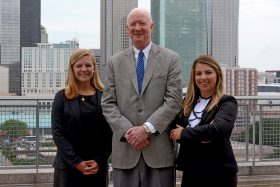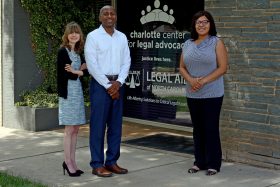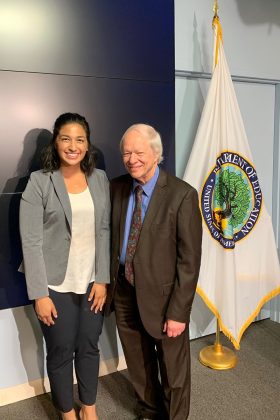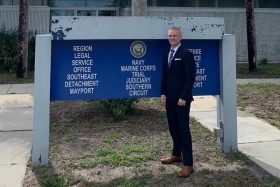Second- and third-year Elon Law students completed internships over the summer months with judges, law firms, nonprofits and government agencies around the United States.



They’ve represented clients under the supervision of practicing attorneys. They’ve drafted and revised opinions on behalf of judges. They’ve led workshops and presentations to help explain legal concepts to non-lawyers.
They’ve worked for public defender and district attorney offices. Law firms both big and small. Judges’ chambers. Government agencies and nonprofits. Colleges and universities. Real estate developers and the United States military.
And Elon Law students traveled across the nation for their 2019 summer internships, which offered opportunities to hone legal knowledge learned in the classroom or, for students preparing to graduate in December, to further strengthen skills developed earlier this year while completing their residencies-in-practice as part of the law school’s highly experiential program.
A partial list of summer employers includes positions in government, private law firms, corporate counsel and nonprofits:
- American Legislative Exchange Council
- The Carroll Companies
- Charlotte Center for Legal Advocacy
- Duke Energy
- Fox Rothschild LLP
- Greater Boston Legal Services
- Legal Aid of North Carolina
- North Carolina Business Court
- North Carolina Court of Appeals
- North Carolina Department of Justice
- Supreme Court of New York
- U.S. Navy JAG
- Volvo Financial Services
“Our accelerated program provides students with summer internship opportunities in addition to full-time residencies during the second year,” said Melissa Duncan ‘06 L’09, assistant dean for career & student development. “They use their placements to gain experience in their practice area of interest and to make connections in the geographic area in which they may want to work after graduation.
“And the skills they learn, and the connections they make, often help lead to their first legal position after graduating.”
Elon Law is the first and only U.S. law school to integrate in-depth learning by doing into its curriculum through required residencies. In their residency, second-year law students work 32 hours a week over a 10-week trimester. Students work with their judge or attorney supervisor and a faculty member to create a learning plan for their residency.
Visit the Office of Career & Student Development for more information on summer and full-time career opportunities. And learn more about the summer legal work experiences of six Elon Law students:
Edwina Avbuere
Class of 2020
Regions | Washington, D.C.
Responsibilities: Monitor hearings held by the House Financial Services Committee and the Senate Committee on Banking, Housing, and Urban Affairs and their various subcommittee; perform research on regulatory and public policy issues facing Regions and the financial services industry.
“I have been interested in government affairs since December. Working in an office where I was actually doing the work of lobbyists, sitting in on conference calls with teams dedicated to improving the work of Regions, and directly interacting with other lobbyists gave me the opportunity to learn what my professional life might be if I continue to pursue government affairs. … This experience has definitely informed my 2L job search and will affect what I look for in my residency.”
Abigail Blatt
Class of 2019
United States Department of Health and Human Services’ Departmental Appeals Board | Washington, D.C.
Responsibilities: Mediate equal employment opportunity complaints, draft settlement agreements, write letters to clients, correspond with clients who are interested in using ADR services, help lead a basic mediation skills training course to federal employees
“I’m interested in enhancing access to justice through alternative dispute resolution programs. I have been strengthening my legal skills in a variety of ways and am enjoying learning about government ADR programs. Last summer, my internship was focused on enhancing access to justice initiatives through court ADR programs, so this placement has allowed me to build on my current skill set while learning about conflict resolution through a wider lens.”

Tori Ford
Class of 2020
Department of Education Office of the General Counsel | Washington, D.C.
Responsibilities: Legal intern for the divisions of Educational Equity and Legislative Counsel, collaborating with the Office of Civil Rights to host the annual Supreme Court Roundup highlighting key cases recently decided by the Supreme Court pertinent to the Department’s work.
“My fellow legal interns and I presented to hundreds of employees regarding some of the most prominent cases before the Supreme Court during the 2018-2019 term, including the Census citizenship question. A key moment was visiting the Supreme Court to hear the justices read out some of these decisions. It was an honorable and surreal moment. … My experience has confirmed my passion to continue pursuing a legal career in the federal government. I enjoy the service aspect, substantive legal work, and work-life balance this career path offers.”
Mackenzie Karnes
Class of 2019
North Carolina Business Court | Charlotte, North Carolina
Responsibilities: Research, draft, and revise opinions for Chief Judge Louis Bledsoe
“Having grown up with parents who started their own company, I’ve always been enamored by business, and the intersection of business and the law piqued my interest because the field gives attorneys the opportunity to identify innovative solutions to problems. Participating in drafting an opinion has been a highlight of my summer. I attended the hearing, checked in with attorneys on the case, researched the law, drafted a memorandum pertaining to the topic, revised the memo and converted the draft into an opinion which will be published. The experience of ‘seeing how the sausage is made’ taught me the importance of precise brief drafting, concise oral arguments, and amicable relationships with opposing parties.”
Kathryn Romo
Class of 2020
U.S. Citizenship and Immigration Services, Office of the Chief Counsel | Raleigh, North Carolina
Responsibilities: Reviewed records of proceedings from appealed visa files and drafted corresponding briefs that the OCC could submit to the DOJ’s Board of Immigration Appeals for the respective cases; ascertained whether naturalization cases and adjustment of status cases should be approved or denied in light of the applicants’ convictions.
“My most memorable experience as a legal intern was when I gave legal advice to my first ‘client.’ I was tasked with reviewing a file to determine whether a legal permanent resident could naturalize despite his extensive criminal history. I researched whether his previous convictions had immigration consequences using case precedent, found that they did not, and determined he could become a U.S. citizen. My supervising attorney then told me to report my findings to the USCIS Supervisory Immigration Services Officer handling the case, which is when I realized this would be my first time counseling a client – albeit under supervision – which I found to be both exciting and a bit nerve-racking since a person’s future rested on my legal analysis.”

Chris Schroeder
Class of 2020
U.S. Navy JAG Corps | Jacksonville, Florida
Responsibilities: Assist in trial preparation including legal research, assisting in motion drafting, and formulating trial strategies; screen incoming cases and decide whether to prosecute based on the case’s merits.
“I chose to be a Navy JAG intern because of my desire to become a Navy JAG after graduation. The work I complete has a purpose – every decision I make influences not only a case, but a real person. The work that I do is the exact same work that every Navy JAG prosecutor does, granted my work product takes a few more attempts than the JAGs. … Also, working on a case that has international implications and is on national news is really neat. Being one of the six members of a trial team for such a massive case is something I will be very proud of for a long time, regardless of the outcome.”


